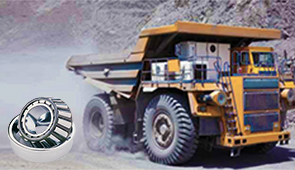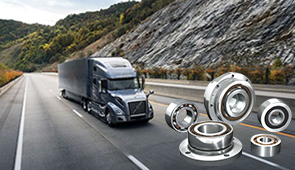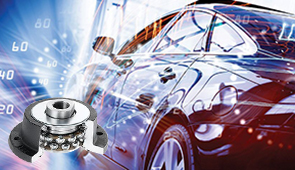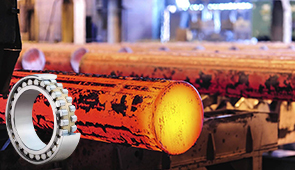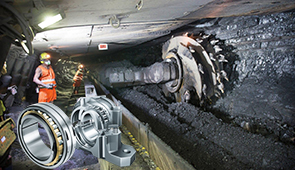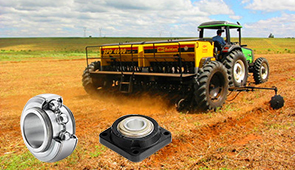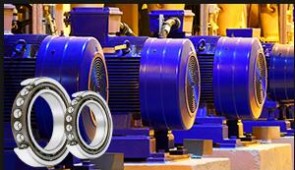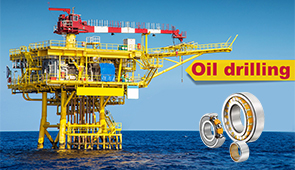Timken vs SKF: A Comprehensive Comparison of Bearing Brands
Industrial-grade engineering toys”almost suggests that bearings will be chosen on the last basis, affecting efficiency and longevity, when in fact they have a very important part to play in both. Therefore, the big leaders-the names in bearing production, Timken and SKF-stick around trying to serve all operational needs with their wide product ranges. Now, how do the two brands really stand up to the little questions of innovation, quality, and application-specific benefits? This article is attempting to give a thorough comparative analysis of Timken and SKF in part so that we may have some informed choice between them for our varied requirements. Engineers, procurement managers, or even just someone trying to explore options for another project-there will be enough to fully understand these two powerhouse brands and their strengths and differences from this comparison.
Product Range of Timken and SKF Bearings
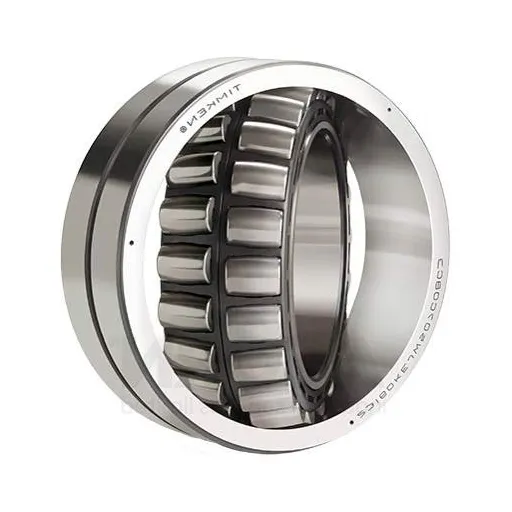
Types of Bearings Offered by Timken
Timken offers a diversified range of bearing products for various types of industrial needs. The primary types of bearings manufactured by Timken are: tapered roller bearings, spherical roller bearings, cylindrical roller bearings, and plain bearings. Tapered roller bearings are the hallmark of Timken and are able to support radial and axial loads simultaneously. These bearings find applications in heavy machinery such as gear boxes, axles, and construction equipment.
Spherical roller bearings are designed to support heavy radial loads and light axial loads. Due to misalignment, they perform reliably in industries like mining, metallurgy, and wind energy. Likewise, cylindrical roller bearings are mainly used for heavy radial loads and are very efficient at high speeds, such as for gear drives, compressors, and electric motors.
Timken also manufactures plain bearings emphasizing simplicity and durability. These are used mostly in oscillating movements in different kinds of heavy industrial equipment. Additionally, their portfolio extends to specialized products such as needle roller bearings and ball bearings that answer niche needs in various industries. With such an extensive offering, Timken consolidates its position as a trustworthy supplier able to attend to diverse operational requirements.
Types of Bearings Offered by SKF
SKF has bearings in all types and sizes for every industry and application, from those smaller and less demanding applications, where it is required to be very high speed, to those larger and more demanding. Hence, their characterization consists of many types of bearings, all designed and constructed with great precision and all optimized toward a certain application view.
Of main interest are ball bearings, famous for their utmost versatility and most commonly utilized in a variety of applications-from household machinery to heavy industrial machinery. Provided with precision engineering, the deep groove ball bearings offer impeccable performances at relatively high speeds, whereas angular contact ball bearings find application where there is a necessity for high precision and the ability to take up loads in several directions.
The roller bearing family is another important category in the bearing division and is designed to bear heavy radial loads efficiently. SKF specializes in cylindrical roller bearings, spherical roller bearings, and tapered roller bearings, each of which offers specific performance advantages. For example, spherical roller bearings find wide applications in industries where there is a demand for high load capacity combined with misalignment tolerance, such as in mining and manufacturing. In addition, SKF markets needle roller bearings, which are compact in size and fit well in applications where high load capacity is needed but space is limited.
In complement with these options are a variety of plain bearings, including bushings and thrust washers that are very often chosen for applications that call for simplicity, durability, and almost hostile working conditions. SKF also specializes in engineered bearing solutions, including high-temperature bearing solutions, hybrid ceramic-bearing solutions, and solutions for special or extreme environments. Such a broad scope enables SKF to continue leading in innovative bearing solutions aimed at improved performance, life, and dependability.
Quality and Performance Analysis
Timken Bearings: Quality Standards and Testing
Timken Bearings are manufactured under stringent quality control protocols to ensure reliability and performance for various industries. The company adheres to international standards such as ISO 9001 and IATF 16949, which impose rigorous requirements on design, development, production, and quality assurance. The latest methods of non-destructive testing are employed for defect detection and to confirm structural integrity; these include ultrasonic, magnetic particle, and X-ray inspection methods.
Now, this one more common approach to understanding Timken lies in materials and material sciences…high-grade steel alloys and proprietary heat treatments are used to develop hardness, wear resistance, or fatigue life. Through bearing life testing simulated under operational requirements, test include various loads, rotational speeds, temperatures, and contaminations, and are verified against these loads and speeds to ensure they meet the actual use criteria with a possible improvement in industry dependence. The data gained from these tests undergo analyses by advanced software platforms to forecast bearing life and relieve bearing points that respond to application in real-time, to stand as the top class in dependence.
Precision manufacturing merges with rigorous testing to put Timken Bearings well within and beyond even the most stringent requirements expected in aerospace, automotive, and industrial applications.
SKF Bearings: Quality Assurance Processes
SKF Bearings are renowned for stringent quality assurance procedures aimed toward reliability, durability, and performance. Depending on operational conditions, one would like to ensure, verified by the raw materials selection procedure comprising material analysis techniques like spectrography and ultrasonic testing for composition, uniformity, and integrity. Each bearing passes through precision machining that employs micro-tolerance standards to reduce dimensional deviations and improve load distribution.
Moreover, SKF uses advanced test technologies such as accelerated lifecycle testing and vibration analysis to verify the operational characteristics. The live data coming from tests get into the digital platforms of SKF, which employ predictive analytics leading to potential weak spots before they can be manifested in the field. The process itself conforms to ISO standards, which ensures that international benchmarks of performance are applied across production cycles with minimum variance.
Additionally, testing for extreme environmental conditions determines the ability of SKF bearings to find applications requiring resistance to high temperature, corrosive atmospheres, and fluctuating pressures. It is through this amalgamation of strong engineering principles and a continuous innovation culture that SKF has positioned itself at the forefront of bearing technology, frequently reaching and sometimes surpassing the needs of the industry.
Performance Metrics: Timken vs SKF
SKF bearings function more efficiently under the functionality of high speed and less friction, while Timken bearings are differentiated due to resisting heavy pressure and loads.
|
Key Point |
SKF Bearings |
Timken Bearings |
|---|---|---|
|
Load Capacity |
Moderate to high |
High |
|
Speed |
High-speed optimized |
Reliable at all speeds |
|
Durability |
Long-lasting |
Extremely robust |
|
Friction |
Low |
Moderate |
|
Precision |
High |
Very high |
|
Applications |
High-speed, precision |
Heavy-duty, industrial |
|
Cost |
Higher |
Moderate |
|
Innovation |
Advanced materials |
Specialized designs |
Durability and Reliability in Real-World Applications
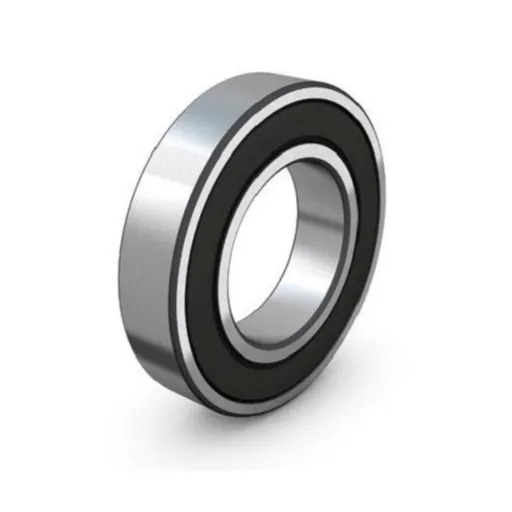
Durability of Timken Bearings in Various Applications
Timken bearings have been designed with special attention given to ensure durability under tough conditions, encompassing a multitude of industries. This makes durability a special concern in modern materials, precise manufacturing, and thorough testing. Below are some of the areas where Timken bearings show exemplary reliability and longevity:
- Aerospace: Timken bearings improve aircraft performance because they are engineered to remain precise under high stresses and temperatures and maintain their strength under extreme temperature variations. With advanced metallurgy, reduced wear levels are ensured during takeoff, flight, and landing.
- Wind Energy: Bearings of wind turbines are subjected to high axial and radial loads while running continuously under varying weather conditions. In consideration of service life enhancement for such crucial systems, Timken bearings resist fatigue.
- Mining and Construction: Heavy-duty machinery such as excavators and crushers needs heavy-duty bearings that are capable of handling heavy loads and abrasive materials. Timken solutions become vital in these high-impact environments to curtail downtime and avoid expensive breakdowns.
- Steel Mills: Operating under extreme heat and in highly contaminated environments, steel mill equipment relies on Timken bearings for consistent performance. Their robust design protects against particle intrusion and thermal effects, ensuring longer operational life.
- Railway Systems: Railway applications demand bearings that can endure high-speed rotations and fluctuating loads. Timken bearings ensure the safety and longevity of rail cars, locomotives, and tracks and improve their operational reliability to a great extent.
These instances highlight the versatility and high durability that Timken bearings offer, making them the most preferred choice across industries where-performance under challenging conditions is of utmost importance.
Durability of SKF Bearings in Various Applications
SKF bearings are appreciated for their durability and sheer performance spanning numerous applications. With elaborate engineering and testing protocols in place, these products are made to offer guaranteed performance even in the most extreme operational environments. We share below the five critical application industries, bearing the brunt of daily operations from your typical SKF bearing, along with performance specifics:
- Wind Turbines: Underground and adverse environmental conditions are experienced in wind turbines, requiring SKF bearings to contend with very high and fluctuating loads. Being low-friction and using materials, which are highly resistant to abrasive wear, they prolong the life of the turbine system and cut down maintenance cost cases. Field studies yield a life estimate for SKF wind turbine bearings that lasts over 20 years with minimal degradation.
- Mining and Quarrying Equipment: Mining equipment and quarrying have to withstand abrasive particles with heavy shock loads and much longer operating hours. Thus, SKF spherical roller bearings have been given rugged seals and treated with unique heat treatment processes to meet these challenges. These bearings exhibited a service life that was about 30% longer than the industry standard bearings in mining applications.
- Food and Beverage Processing: Bearings designed by SKF for food processing are corrosion resistant and sealed against ingress of moisture and contaminants. Made for hygiene-critical environments, they conform to global food safety norms. Some investigation and study have proven that SKF stainless steel bearing requires much less frequent replacements, thereby bringing down downtime by nearly 40%.
- For marine propulsion systems: The marine environment requires bearings resistant to saltwater ingress, vibration, and intermittent heavy loads. Using advanced coatings and lubrication technology, SKF marine bearings prevent corrosion and accelerate wear. Test results reveal that SKF marine bearings perform optimally after extended exposure to saltwater environments.
- Steel Mills: The SKF bearings used in steel rolling mills stand heat and heavy loading and high speed of rotation. Their advanced thermal stability and resistance to fatigue enable steel mills to effectively run their operations on a continuous basis. Evaluations showed that SKF bearings would work under temperatures in excess of 400°F (204°C) without adversely affecting their operational integrity.
The flexibility of SKF bearings has enormously magnified their scope of use, ensuring long-lasting success in settings marked by intense performances. With innovative materials and engineering, they still stand as a reference for reliability and performance in the industry.
Pricing Comparison: Value for Money
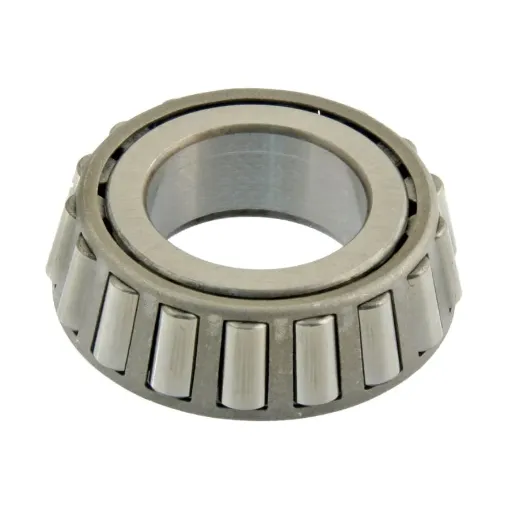
Cost Analysis of Timken Bearings
Timken bearings have attracted a world under their strong application for heavy load carrying and extreme endurance. From a cost analysis perspective, Timken bearings usually come at the upper price bracket in comparison to other options available hence justifying their advanced design and material quality. A host of improved design features and the use of high-grade steel coupled with an innovative heat treatment process make for a longer bearing lifespan and higher fatigue resistance, thereby resulting in considerable long-term savings on the operational front.
A close scrutiny of purchase and maintenance expenses reveals that the initial investment for Timken bearings may seem steep; however, the lower purchase frequency and maintenance required bring greater economic returns in the long run. According to different case studies from industrial practice, Timken bearings generally rank above competitor brands in terms of actual carrying capacity and wear resistance, particularly high-demand operations like manufacturing and heavy machinery.
Thus Timken bearings classified as premium, yet economical, choice for any company willing to foster operational reliability with high-life-cycle trade-offs over initial expense.
Cost Analysis of SKF Bearings
Almost all industries use SKF bearings with exceptional standards of engineering quality and the widest product range used to suit various industrial requirements. Various considerations are put into the costs of SKF bearings, including the purchase price, operational life, and maintenance requirements. On the contrary, SKF bearings maintain the reputation of being more expensive than the average market price. So it is fair to say that their relative cost is well-justified when requiring high precision, long reliability, and fewer downtime issues.
Skewer the Shaft bearings cost-wise, one of the key advantages is their maintenance-free operational characteristic, which reduces all operational expenditures. It has a higher level of material engineering and lubrication technology, thus having very extended service intervals, mainly lowering the number of replacements and the labor cost for it. On top of it, such bearings are also designed to allow full operation with suitable environmental factors, at high load or speed conditions, preventing early wear and tear, which could increase the cost in fast-wear competitive alternative bearings.
SKF has also installed digital monitoring systems into several of its bearing solutions so that performance analysis and predictive maintenance scheduling may be conducted in real-time. This feature helps prevent unexpected failures and economic loss and thereby provides an added value to industries with critical production cycles. A lifecycle cost evaluation shows that SKF bearings deliver better durability and operational efficiency on average, thereby saving on total cost of ownership, notwithstanding their relatively high price.v
Evaluating Cost vs Performance
SKF bearings give high precision and speed but are costlier, while Timkens give wear resistance and compaction of big loads for less.
|
Key Point |
SKF Bearings |
Timken Bearings |
|---|---|---|
|
Cost |
Higher |
Moderate |
|
Durability |
Long-lasting |
Extremely robust |
|
Load Capacity |
Moderate to high |
High |
|
Speed |
High-speed optimized |
Reliable at all speeds |
|
Friction |
Low |
Moderate |
|
Precision |
High |
Very high |
|
Applications |
High-speed, precision |
Heavy-duty, industrial |
|
Maintenance |
Low |
Minimal |
Industry-Specific Applications and Recommendations
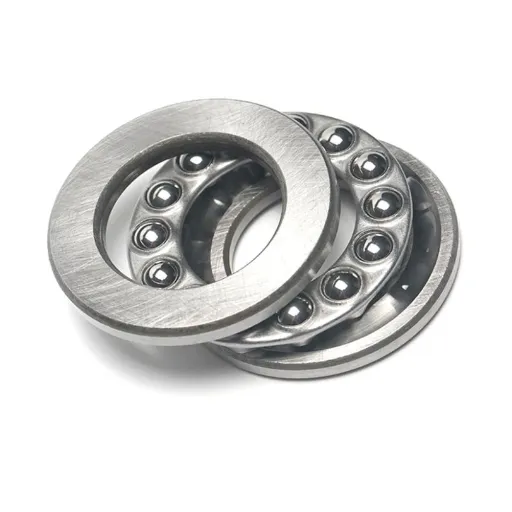
Applications Best Suited for Timken Bearings
Bearing Timken means are inadvertently made to stand up to hard-working terrible environments and thereby exhibit excellent performance. Therefore, heavy equipment and industrial applications are some of the options where these bearings find application. A list of five major applications where Timken bearings are in advantage with a focus on details follows:
- Mining and Quarrying Operations: Timken bearings are designed to stand up to heavy loads and rough terrain of mining and quarrying operations. They find application in conveyors, crushers, and vibrating screens, to mention a few, where reliability in load capacity and durability are demanded.
- Steel and Metal Works: Timken bearings heat, and steel mills experience the stresses and high temperatures of metal processing plants, while others see to it that the other type of application gives reliable performance to steel mills. Timken bearings are used in the applications of rolling mills, continuous casters, and gearboxes.
- Wind Turbines: Wind turbines require maintenance, thus the bearing Timken must be reliable and must last a long time. They must hence guarantee the reliability of the shafts, gearboxes, and pitch and yaw systems through weather and changing load conditions.
- Railroad and Transit Systems: The safety of railroad operations and their effectiveness are guaranteed by the use of Timken bearings. This robust design can resist severe loads and vibrations, making it appropriate for wheel hubs, traction motors, and gear systems.
- Aerospace and Defense: Aerospace and Defense require a high degree of precision and reliability. And that is why Timken bearings are used in jet engines, landing gear, and sophisticated military vehicles. With these applications, one can see the capability of Timken in providing the best performance through precise engineering, especially for tests where reliability is required.
Each of these applications highlights Timken’s ability to deliver superior performance through meticulous engineering, particularly in demanding environments where reliability is paramount.
Applications Best Suited for SKF Bearings
SKF bearings are precision-engineered with advanced materials and find application in various fields. Following are the five applications where SKF bearings perform especially well, along with their respective detailed performance characteristics:
- Industrial Automation and Robotics: SKF bearings are paramount in industrial automation and robotics, providing extremely precise rotation under low friction and superior durability. Their advanced design in high-speed manufacturing processes allows the least downtime, thereby increasing process efficiency.
- Renewable Energy Systems: Manufactured for severe environmental conditions, such as those in wind turbine and solar tracking systems, SKF bearings offer great ability to bear heavy loads and resist environmental stressors such as extreme temperature and high humidity. Properly optimized, these bearings help reduce maintenance costs while prolonging the operational life of the systems.
- Automobile and Electric Vehicle (EV):SKF bearings are widely used in electric motors, transmissions, and wheel hubs, helping keep noise down, improve energy efficiency, and sustain high-speed capability as required by modern EVs. Test data shows they improve energy efficiency by 30% over conventional bearings.
- Heavy Machinery and Construction:Extremely suitable to be employed in heavy construction equipment and mining machinery, SKF bearings are designed to resist very high shock loads and still provide a great axial and radial load capacity unto continuous operation in severe environments.
- Marine and Offshore Applications:SKF bearings for marine application are provided with special corrosion-resistant coatings and sealed design for propulsion systems, cranes, and anchors. That they feel very comfortable being dynamically loaded whilst being exposed to saltwater makes them the commonly chosen bearings for offshore platforms.
Each of the listed applications represents yet another opportunity to demonstrate SKF’s ability to innovate and manufacture reliable products, thereby positioning their bearings as key items in industries where working efficiency and durability are paramount.
Choosing the Right Bearing for Your Industry
Selecting the suitable bearing for an industrial application requires the careful study of several critical factors that influence the ability of the bearing to perform and last. Other things to consider when choosing a bearing include load capacity, operating environment, speed, and maintenance requirements. Spherical roller bearings are considered robust enough to withstand extreme radial or axial loads and their applications include the steel industry or mining, while compensating for misalignment. On the other hand, industries such as aerospace or medical equipment would more often rely on angular contact ball bearings because of their high speed and high precision.
Environmental conditions are paramount in bearing selection. For any industry under severe temperature extremes, like power generation or chemical processing, operating bearings at high temperature with special lubrication would be accepted if reliable service is to be maintained. Similarly, industries thronging the corrosive environments such as food processing or marine settings would normally have need for stainless steel or coated bearings, which put up a good resistance to wear and corrosion.
An evaluation of the speed of operation must be done. In the high-speed electric motor or turbine system, those that are at the edge of the renewable energy industry have the tendency to always be designed with bearings that can run quietly at very high rotational speeds, with new lubrication solutions often aiding in heat dissipation.
Depending on your industry’s specific requirements, an optimal setting of bearing characteristics brings forth more efficiency, less downtime, and an increase in equipment life expectancy. With the aid of a trustworthy supplier like SKF, it is guaranteed that you will have the very latest bearing technology at your disposal to meet the on-the-go demands of modern industrial operations.
Frequently Asked Questions (FAQ)
Q: What are the main differences between Timken and SKF bearings?
A: The main differences between Timken and SKF bearings are based on their design, materials, and manufacturing processes. Timken prides itself on high-quality steel and strict quality control measures, while SKF focuses on advanced materials and manufacturing processes. Both brands are well-trusted, and Timken may be had as the more natural choice into heavy-duty applications compared to SKF that probably provides broader ranges of bearings suitable for high-speed and precise applications.
Q: For heavy-duty applications, which brand is better, Timken or SKF?
A: Timken has, at times, been termed superior for heavy-duty applications due to the bearing company’s ability to engineer its bearings with great efficiency to handle satisfying both radial and axial load capacity. Timken bearings, in other words, reduce friction more and enable the best usage of machinery components in situations wherein unfavorable operating conditions exist.
Q: Are Timken bearings made in the USA?
A: Many Timken bearings are made in the USA. Production emphasis is on quality control, with advanced manufacturing processes producing high-quality bearings that meet the highest possible standards. This focus on domestic production has made Timken bearings stand for durability and reliability.
Q: How do Timken and SKF bearings compare in performance and longevity?
A: Both Timken and SKF bearings are designed to offer performance and longevity but include those that serve different applications. Timken bearings enjoy a strong reputation for the robustness of their construction and their ability to operate under heavy loads, whereas SKF bearings are famed for their performance in high-speed and precision applications. Having knowledge of the exact needs of your application will allow you to realize the best choice for your application.
Q: What are self-aligning bearings, and who supplies them?
A: The self-aligning bearing supports situations of misalignment between the shaft and the housing, making them applicable when alignment may be an issue. Both Timken and SKF manufacture self-aligning bearings, but SKF is renowned for an extensive product line that includes many designs suited for specific operating conditions.
Q: What are the applications for which Timken bearings are best suited?
A: Timken bearings are better fitted to high load and heavy industries, such as those involving automotive applications or heavy equipment. They not only handle radial and axial load but also reduce friction, something that makes them good for heavy-duty operations.
Q: For my particular requirement, how do I choose among Timken and SKF bearings?
A: Choice between Timken and SKF bearings should be driven by the specific construct of the application. Types of loads, speeds, external environment, and so on should be considered. Timken would generally be the better option under heavy-duty use conditions, while SKF would be chosen as a high-speed service bearing. Materials and manufacturing processes in between these two brands will give you the best view on which one to choose.
Q: What are the quality assurance implementations for Timken and SKF bearings?
A: Both Timken and SKF incorporate quality control measures to assess if the bearings offered are at the highest standard level. Timken undergoes their bearings through highly advanced manufacturing process and uses the highest quality materials to produce the best working bearings, while SKF would be concentrating on advanced materials and manufacturing practices with aspects of constant improvement so that both brands result in very useful and reliable products.
Q: Could you explain “high-performance bearings” concerning Timken and SKF?
A: High-performance bearings are products that can provide great precision in difficult working conditions, superior load handling, low friction, and long service life. Timken may call its high-performance bearings heavy-duty bearings, whereas SKF may designate its advanced bearings toward high-speed and precision bearing applications. Both brands use advanced materials and manufacture techniques to come up with reliable bearings that fulfill the specific applications of various industries.
UCTH213-40J-300 with Setscrew(inch)
CNSORDERNO: Normal-duty(2)
TOGN: UCTH213-40J-300
SDI: B-R1/8
SD: 2 1/2
UCTH212-39J-300 with Setscrew(inch)
CNSORDERNO: Normal-duty(2)
TOGN: UCTH212-39J-300
SDI: B-R1/8
SD: 2 7/16
UCTH212-38J-300 with Setscrew(inch)
CNSORDERNO: Normal-duty(2)
TOGN: UCTH212-38J-300
SDI: B-R1/8
SD: 2 3/8
UCTH212-36J-300 with Setscrew(inch)
CNSORDERNO: Normal-duty(2)
TOGN: UCTH212-36J-300
SDI: B-R1/8
SD: 2 1/4
UCTH211-35J-300 with Setscrew(inch)
CNSORDERNO: Normal-duty(2)
TOGN: UCTH211-35J-300
SDI: B-R1/8
SD: 2 3/16
UCTH211-34J-300 with Setscrew(inch)
CNSORDERNO: Normal-duty(2)
TOGN: UCTH211-34J-300
SDI: B-R1/8
SD: 2 1/8









